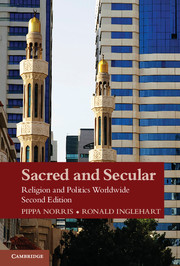Preface and Acknowledgments
Published online by Cambridge University Press: 05 June 2012
Summary
The events of 9/11 and their aftermath in Afghanistan and Iraq have shaken scholarly assumptions about “the end of history” and the post–Cold War peace dividend – and the study of religion has suddenly emerged into the glare of public attention. Is religious conflict now the central issue? Were the prophecies of a new “clash of civilizations” being realized? Speculation about these matters was fed by a rapidly expanding literature on everything from the causes of terrorism to divisions in the Atlantic alliance, the prospects for democracy in the Middle East, and the nature of Islamic beliefs.
Social scientists are divided about whether the process of secularization is reducing the role of religion in everyday life – or whether the world's major religious faiths are experiencing a strong resurgence. Fortunately, a massive body of new evidence about the underlying factors driving religiosity around the globe has recently become available. This book uses this evidence to reexamine the classic questions about the nature of religion. Building on ideas Weber and Durkheim developed a century ago, it develops a new theoretical framework for understanding how the experience of existential security drives the process of secularization. We test this theory against evidence from the Values Surveys 1981–2001, which have carried out representative national surveys in eighty societies around the globe, covering all the world's major faiths. This analysis builds on our previous book, Rising Tide: Gender Equality and Cultural Change Around the World (2003), which examined the role of religiosity in explaining egalitarian or traditional attitudes toward the roles of women and men. We hope that this study will contribute to informing the debate about the role of religion in the contemporary world.
- Type
- Chapter
- Information
- Sacred and SecularReligion and Politics Worldwide, pp. xiii - xviPublisher: Cambridge University PressPrint publication year: 2011



